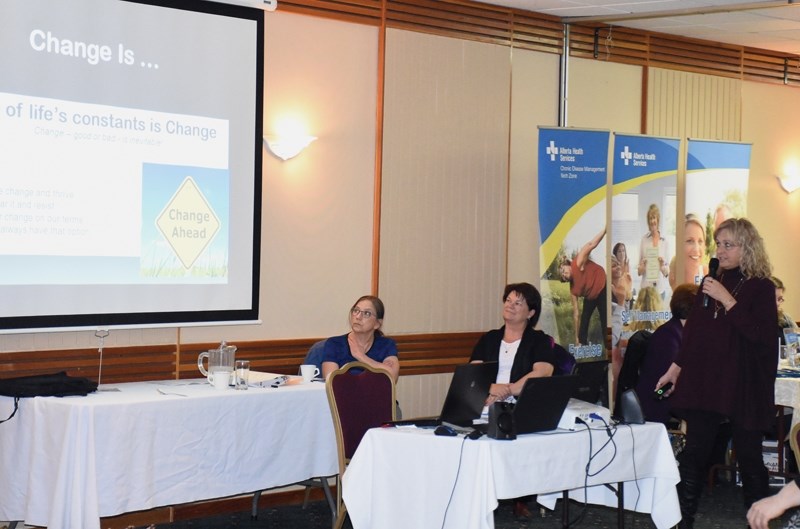Change is inevitable and the fourth annual Women’s Symposium was all about embracing it.
Organized by the Aspen Primary Care Network and Hope Resource Centre, the March 8 conference at the Westlock Inn coincided with International Women’s Day.
Rotary Club district governor Laura Morie kicked of the morning with a message about community and its meaning.
“It is a place where we feel valued, cared for and supported,” she said.
Morie grew up in Westlock but left at 17 only to come back at age 40, single with two young children, to be with her ailing father.
She said the community welcomed her and gave her a chance when she took over her father’s business.
“Choices, change and options — that is how we build meaningful lives,” she said.
“When we create situations where people have the opportunity to make choices rather than have to.”
Community building
To mark International Women’s Day, she recognized achievements women have made in the last century — 1916 when women won the right to vote in Canada, the 1950s when the last territory recognized women as persons and the 1970s when women could apply for credit under their own name.
“Part of building a community means that we all have a voice and that we empower and support and recognize that everybody has something valuable to say and something to contribute,” she said.
Communities must also support young people and act as mentors for them as they struggle with unemployment or underemployment. Seniors also need support because “poverty is sexist,” Morie noted, and a community’s responsibility is to support, uplift and empower.
“We need women’s symposiums because it’s still sexist,” she said. “When we have failing or insufficient support, seniors — mostly women — feel those financial pressures more than people in midlife. And younger people who don’t have opportunity also feel those pressures.”
Morie also touched on representation in politics and encouraged women to use their voices in the October municipal election.
“We have made progress, and it has not always been pretty, and change only comes when we can confront problems,” she said. “Things do not change because we think they should. Change happens because we take action and speak up.”
Changing attitudes
Keynote speaker Leslie Phillips from Aspen Primary Care Network spoke about embracing change that has happened and is happening in the present.
“Some things we can’t change at all and some things we can change,” she said. “It’s learning the difference and adjusting is a large part to the secret to a happy life. Concentrating on things we can’t change causes frustration, disappointment, and depression.”
Whether it’s the climate, the moon, our family or age, Phillips pointed out that those are things we can’t change. We also cannot change how people act or what they say, however, she said we can change our own expression, mind and attitude.
“If you have a positive attitude, you will be happier, you will enjoy life more and you will succeed,” she said. “If you cannot change your circumstances or your situation, you can change your attitude towards it.”
However, she noted that attitudes are based on beliefs, values, feelings, and moods and although optimism is a choice, sticking to something that you want to change only makes a person feel stuck.
Accepting change
The second keynote speaker, Hope Resource Centre’s Sylvia Yoder, spun off on that point and touched on the challenges of changing, how it can be scary and difficult, but there is power in embracing it.
“Most of us prefer change on our own terms and we’re discovering that we don’t always have that option,” she said.
Going through that change can be difficult, and she said at times there is anger, loss, hurt, blame, illness and doubting one’s ability.
Yoder gave a personal example of the sudden death of her husband eight years ago and last year catching pneumonia from work-related stress.
“I suspect that anyone of us that has experienced trauma in our life, we’re not quite as flexible with change as other people might be, so that’s something to consider. It doesn’t mean there’s something bad about you.”
Embracing change involves looking at it from a new and positive way, she said, by exploring the possibilities; self-evaluating how one feels physically, mentally and emotionally; reassessing goals, and finding alternatives.
“The very act of taking control of your own life brings massive changes. You are always going to find people who are offering you platitudes that aren’t that helpful. The most effective thing you can do to embrace change is take control of your life.”
That includes identifying the obstacles, persevering when things don’t work out, letting go of the past, being grateful for what one has and focusing on what can be changed.
And remembering that everyone has overcome change before.
“Sometimes it’s a process and I’m going to tell you that really painful process leaves wonderful results, so look at that rainbow. Focus on that rainbow.”



